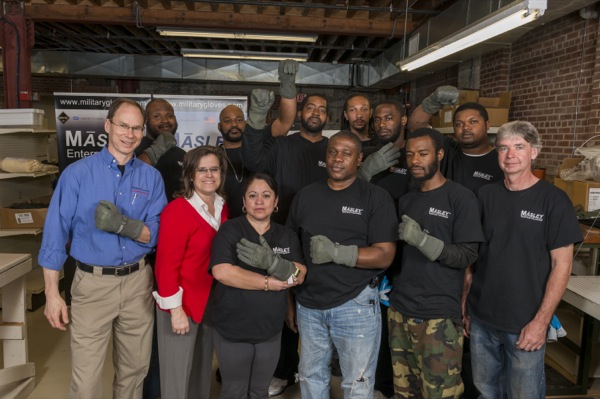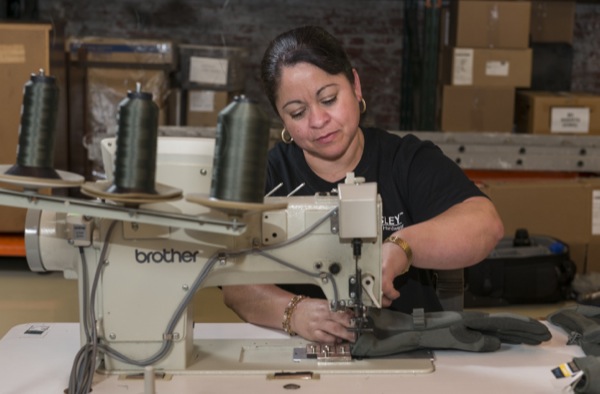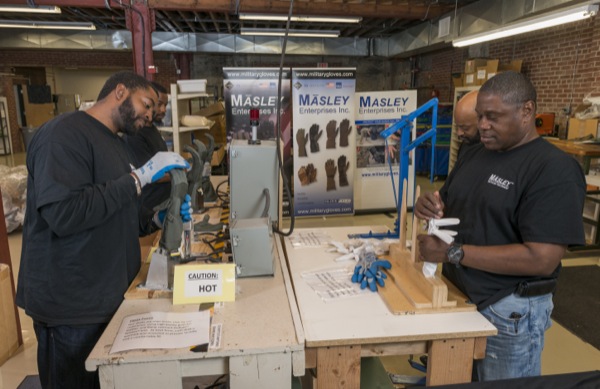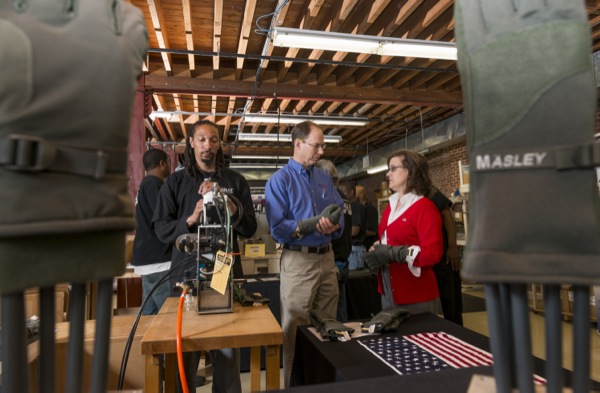


Hands-down winner
Military glove maker assisted by resources at UD
11:44 a.m., April 29, 2013--Legend has it that that Ralph Waldo Emerson once said, “If you build a better mousetrap, the world will beat a path to your door.”
Frank Masley’s better mousetrap was actually a better military glove — one that protects soldiers from fire, water, fuel, and germs while also providing warmth and preserving dexterity.
Campus Stories
From graduates, faculty
Doctoral hooding
The former Olympic luger conceived the idea for the gloves while working at W.L. Gore and Associates as a textile engineer, and in July 2000 he launched his own business to develop, manufacture, and market his idea.
Working in the basement of his home with his wife, Donna, as his partner, Masley came up with the design, which uses Gore-Tex fabric, and he even taught himself to sew.
But he quickly learned that even if you build a better military glove, the Army will not necessarily beat a path to your door.
“I was a little bit embarrassed,” Masley admits. “I had a degree in mechanical engineering, an MBA, and 11 years of experience at Gore, so I felt like I should know what I was doing. But I didn’t. Corporate experience doesn’t prepare you for being a small business owner — getting the gloves out there was a hard sell.”
Fortunately, Masley had learned about the Delaware Small Business and Technology Development Center (SBTDC) and the Procurement Technical Assistance Center (PTAC) in a class he took while studying for his MBA at Goldey Beacom College in the 1990s.
In 2002, Masley decided to explore these resources, both of which are part of the Office of Economic Innovation and Partnerships (OEIP) at the University of Delaware. Since then, he says, he’s taken just about every class offered by the two centers.
“SBTDC assisted me with my business plan, and PTAC helped us get a GSA (federal General Services Administration) Schedule Contract, which basically makes it easier for the government to buy from us,” he adds.
SBTDC also helped with financial projections, marketing advice and analysis of software options and is currently working with the Masleys to research export opportunities.
In addition, PTAC staffer Dana Reece assisted the couple with getting Masley Enterprises certified as a female-owned business and matched them with other small U.S.-based companies that work on intermediate sewing and assembly steps in the glove manufacturing process.
On the advice of Juanita Beauford, PTAC of Delaware director, Masley Enterprises recently became the first business in Wilmington, Del., to take advantage of the Small Business Administration’s HUB Zone Program.
HUB, an acronym for Historically Underutilized Business, provides incentives for companies to move into low-income, high-unemployment areas. In turn, businesses using the program are required to draw at least 35 percent of their employees from within the zone.
The property the Masleys purchased and occupied in February is a former mill on the banks of the Brandywine River in Wilmington’s Eastside neighborhood. Their employees, many of whom have never had regular jobs, now report to work in an environment that not only is safe and comfortable but also offers a water view.
“It’s a team effort here,” says Donna. “We emphasize work-life balance, and our employees know that if they have an issue — with child care or transportation, for example — they can bring it to us, and we’ll do our best to help them resolve it. We really respect our employees, and they know that.”
The glove plant is run according to “lean manufacturing,” an approach aimed at maximizing value and minimizing waste. The Masleys even shut down production for an entire day at one point so their team could take a class in this methodology at Delaware Technical Community College, enabling the staff to contribute to decision making at the plant.
The Masleys also offer their employees a variety of worksite benefits, including incentives for reduced manufacturing failures, an exercise program to mitigate stress, and social events like lunches and pretzel parties.
“I would encourage more companies to take advantage of the HUB zone designation,” Frank says. “The lines are redrawn every 10 years, and we could lose our status if the program here is successful. But nothing would make me happier than to see that happen. We want more people in Wilmington to be gainfully employed.”
He also urges other small business owners to seek out the support of the SBTDC.
“They genuinely want you to succeed,” he says. “They point you in the right direction, and then it’s on you to take it from there.
John Osoinach, director of the New Castle County SBTDC, agrees. “There’s a lot we can do to support the client,” he says, “but they’re still the ones who make it work.”
About PTAC and SBTDC
Congress created the Procurement Technical Assistance Program (PTAP) in 1985 to help businesses seeking to compete successfully in federal, state and local government contracting. Funded through cooperative agreements between the Department of Defense and state and local entities, PTACs provide a range of expert services at little or no charge. Established in 1999, Delaware PTAC is one of 99 programs in the United States, operating in over 300 locations.
The Small Business and Technology Development Center exists to strengthen Delaware’s economic base by providing quality services such as management assistance, educational programs and resources to Delaware’s business community and potential entrepreneurs. Frank Masley serves on the SBTDC Advisory Board.
Both PTAC and SBTDC are part of the Office of Economic Innovation and Partnerships at UD. Since its formation in 2008, under the direction of former DuPont vice president for research and development David Weir, OEIP has worked with the state, Delaware Technology Park, numerous researchers and companies in creating a culture where innovation and entrepreneurship can thrive in Delaware.
Article by Diane Kukich
Photos by Evan Krape












